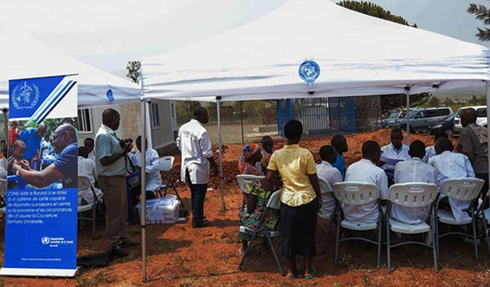June 2020 saw the first applications to access data stored on a new Ebola Data Platform managed by the Infectious Diseases Data Observatory (IDDO), following a partnership with the governments of Guinea, Liberia and Sierra Leone. Significantly, three of the successful applications were from principle investigators based in these disease-affected countries, where these data were originally collected.

TDR has a clear strategic objective to support open science in ways that are effective and ethical. To this end, TDR has worked in partnership with IDDO over a number of years, engaging research communities to share their data for research on malaria, schistosomiasis, leishmaniasis and, more recently, Ebola. TDR is also a strong supporter of fair and equitable data sharing: that is, the data sharing is undertaken in ways that support research capacity in the countries where much of these data originate. These principles align with the approach taken by IDDO which has been working in the field of data sharing for over a decade, with a focus on putting all parties (researchers, policy-makers and patient representatives from affected communities) at the centre when developing a new data sharing platform. Working in this way creates a shared sense of purpose often outlined within an agreed research agenda. Agreeing a research agenda describes the type of research that can be undertaken with the shared data and the public health benefits that come from analysing standardized and aggregated data sets. The aggregated data sets on the Ebola Data Platform (EDP) are larger than any of those included in a single study or a set of patient records from one locality. Consequently, this platform will enable an investigation of treatment outcomes with a greater sample size, for example the benefits of using saline drips during treatment. These aggregated data will also enable analysis for patients that are underrepresented in single studies, such as pregnant women and children.
TDR provides support to IDDO by assisting with the development of the governance mechanism to manage access and by chairing the Data Access Committees that ensure the research undertaken by those accessing the data is in line with the agreed research agenda. One requirement for access to the data on the EDP is that applicants have to describe how their research will support and build research capacity in countries affected by Ebola.
In addition, through its Clinical Research and Development Fellowship (CRDF) scheme and other funding, TDR is supporting researchers from Ebola affected countries to be trained in the skills required to curate and manage large data sets. Recent examples are:
- February 2020–2021: Dr Amadou Woury Jallow is a TDR fellow under the CRDF scheme. Amadou is a Disease Surveillance Officer with The Gambia Ministry of Health. Based at The Royal Veterinary College, University of London, he is working with IDDO's schistosomiasis and soil-transmitted helminthiases theme on a 12-month training programme.
- January 2020: Dr Kwame Oneill joined IDDO as the Platform’s latest Fellow supported by TDR. Kwame is a clinician and District Medical Officer based at the Sierra Leone Ministry of Health and Sanitation. He will be with IDDO for a 12-month training programme with a focus on developing skills in data management, clinical research, data governance and biostatistical analysis.
- August 2019: In collaboration with the Gamal Abdel Nassar University in Conakry, Guinea, TDR funded IDDO to deliver a one week training in research methods for 35 of the University’s clinical assistants, who are responsible for supervision of research theses by medical students.
- December 2017–2018: Mahamoud Sama Cherif, a clinician and clinical researcher at the Gamal Abdel Nassar University, completed a 12-month CRDF at IDDO where he received training and mentorship in data management, clinical research and biostatistical analysis.
In furthering its approach to encourage effective data sharing, TDR has joined the COVID-19 Clinical Research Coalition and is now contributing to the data sharing working group. This group will provide support to researchers from low resource settings in sharing and analysing data from the COVID-19 pandemic, particularly to answer those questions that are relevant to the different context of dealing with the disease in resource-limited settings.
The Ebola Data Platform was set up by IDDO in 2016 to collect and standardize disparate clinical, epidemiological and laboratory data into a central, secure repository. The Platform has been cited by the WHO Ebola/Marburg Research and Development Roadmap as a model for collecting, standardizing and sharing clinical data under the authority of local leadership. The platform was developed in close collaboration with the governments and organizations affected by the 2014-2016 Ebola outbreak in West Africa, in order to address key questions and inform global health responses. The repository now contains data from over 13 500 patients and recently opened to accept data access requests from researchers.
For more information, please contact Robert Terry, Manager, Research Policy.

